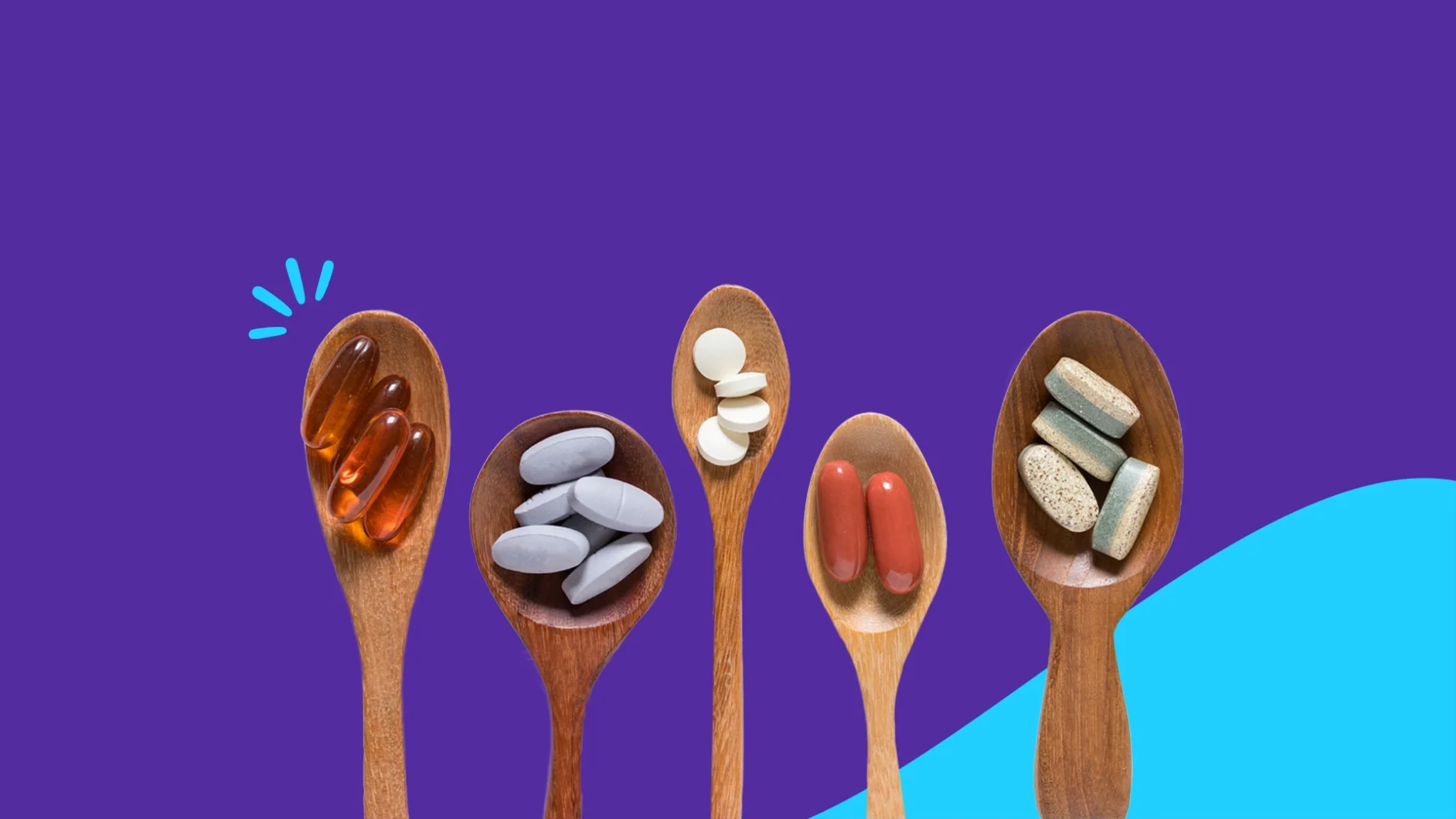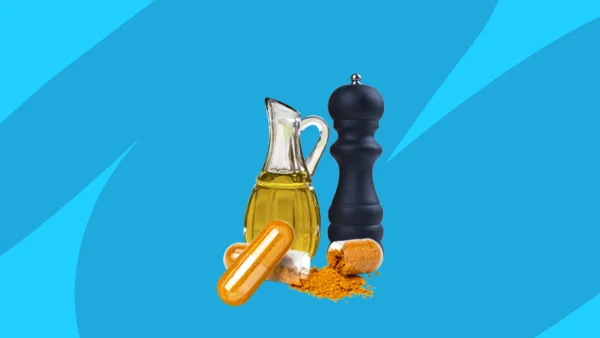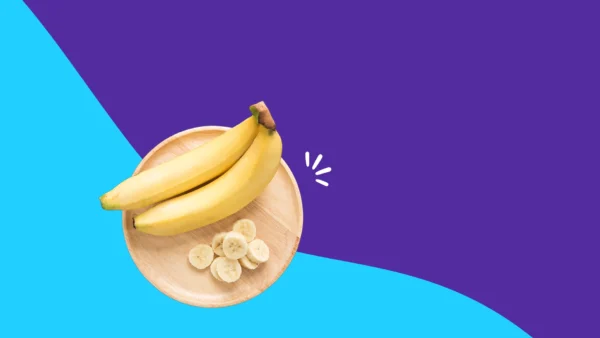Key takeaways
For depression treatment, supplements should be used in combination with medication or therapy—not on their own.
Supplements that may help with mood improvement include vitamin D, B12, folic acid, magnesium, zinc, omega-3 fatty acids, turmeric, and probiotics.
No supplements should be taken before checking with a healthcare provider or pharmacist about interactions.
Depression is one of the most common mental health conditions. In 2021 alone, 21 million adults—or 8.3% of American adults—experienced a major depressive disorder episode. It is more than just feeling sad; it’s a psychiatric disorder with symptoms that can be severe and can seriously affect your ability to function in daily life, socially, and at work. Thankfully, depression is treatable.
The most effective depression treatments are psychotherapy and medication—often a combination of the two. Lifestyle changes that improve your overall health and well-being can also help treat symptoms, including vitamins for depression. Taking dietary supplements shouldn’t be the only way you treat depression, but they do have their place, especially if you are deficient in certain vitamins or minerals. Keep reading to learn which supplements could help.
8 vitamins and minerals for depression
It’s essential to emphasize that depression is a serious mental illness, and vitamins are not a cure-all. You should always see a mental health professional for a comprehensive treatment plan that includes therapy and medication. Then, you can work with your provider to add supplements to your regimen as needed.
Though vitamins and minerals can’t cure depression, they can play a significant role in managing it, says Clifford Feldman, MD, board-certified psychiatrist and medical director at Solace Treatment Center in Whittier, California. “They help by supporting the body’s natural production of neurotransmitters such as serotonin, dopamine, and norepinephrine, which are responsible for regulating mood,” he explains.
Here are the eight best vitamins to try for depression.
1. Vitamin D
Research shows that people with low vitamin D levels have a higher risk of developing symptoms of depression. “Vitamin D, also known as the sunshine vitamin, is important for brain function,” says Soma Mandal, MD, an internist at Summit Health in Berkeley Heights, New Jersey. “Low vitamin D can cause fatigue and is associated with depression and seasonal affective disorders.”
If you think you might be deficient in vitamin D, check with a healthcare provider about how to supplement. According to the National Institutes of Health (NIH), the daily recommended vitamin D dosage for adults is 600 or 800 IUs per day. However, more is often recommended if you are vitamin D deficient. Just keep in mind that vitamin D may interact with certain medications, including weight loss drugs, statins, steroids, and certain diuretics, so you should always consult with your healthcare provider or pharmacist before taking this supplement.
2. B12
“Research has shown that supplementing with vitamin B12 can delay the onset of depression in individuals with B12 deficiency, explains Yelena Wheeler, MPH, RDN, registered dietitian and nutrition writer. For example, a 2010 study found that older adults who supplement with B12 and B6 tend to have a lower risk of developing depression over the next 12 years. A 2020 review found that B12 supplementation may improve the effects of antidepressant medication, such as selective serotonin reuptake inhibitors (SSRIs).
The recommended daily intake for adults is 2.4 mcg of B12 daily. If you are taking gastric acid inhibitors or metformin, you should check with a healthcare provider before supplementing with vitamin B12, as these medications can reduce the absorption of B12 into the body.
3. Folic acid
“Folate helps to produce neurotransmitters in the brain,” Dr. Feldman says. “Inadequate folate
intake has been linked to mental health conditions like depression and schizophrenia.” Indeed, studies have found that people living with depression often have low levels of folate, also known as vitamin B9, which adds to the evidence that supplementation may help improve symptoms of depression.
The average adult should take 400 mcg of folic acid per day, according to the National Institutes of Health (NIH). If you are pregnant, you should take 600 mcg daily; breastfeeding individuals need 500 mcg daily. Folic acid supplements can interact with a few medications, including methotrexate, antiepileptic medications, and sulfasalazine. In addition to folic acid supplements, you can get folate from foods like leafy greens, legumes, and citrus fruits.
RELATED: 10 folate-rich foods
4. Magnesium
A 2017 study found that people who took 500 mg of magnesium oxide vitamins daily for eight weeks had improvements in symptoms of depression. However, these patients were known to be deficient in magnesium. More research is needed to determine if this supplement would improve symptoms for those who are not magnesium deficient.
Daily magnesium recommendations are 400 to 420 mg for adult men and 310 to 320 mg for adult women who are not pregnant. If you are taking certain medications, you should take precautions if you are supplementing with high doses of magnesium. Magnesium is known to interact with bisphosphonates, antibiotics, diuretics, and proton pump inhibitors.
5. Zinc
Research finds that zinc deficiency is linked with depressive symptoms—such as sadness, hopelessness, and feeling numb—and that supplementing can decrease these symptoms. Zinc supplementation can also decrease depression symptoms for people on antidepressants, as zinc may be able to enhance the effects of antidepressants like selective serotonin reuptake inhibitors (SSRIs), Wheeler notes.
Adult men should take 11 mg of zinc daily, and adult women need 8mg. Zinc may interact with certain antibiotics and diuretics, leading to decreased zinc absorption, so make sure to talk to a health professional if you are considering zinc supplementation while taking other medications.
6. Omega-3 fatty acids
There is evidence that omega-3 supplements, also known as fish oil, may help with depression. These fatty acids “are essential for brain health and can enhance the effectiveness of antidepressant medications,” Dr. Mandel explains. Omega-3 fatty acids can also be found in foods like salmon, walnuts, flaxseeds, and chia seeds.
The recommended daily dose of omega-3 fatty acids for adults is 1.6 grams for males and 1.1 grams for females. People taking anticoagulants like warfarin should talk to their healthcare provider before taking omega-3 fatty acid supplements due to a potentially increased risk of bleeding.
7. Turmeric
“Turmeric contains an active compound called curcumin, which has potential benefits, including depression,” Dr. Mandel explains. Research has found curcumin to be effective in relieving symptoms of depression and anxiety in people with major depressive disorder. It also has the potential to help with anxiety. Moreover, turmeric is generally well tolerated by people who use it as a supplement. However, as Dr. Mandel points out, the research we have so far is based on small sample sizes. More research is needed to confirm the link between turmeric and depression.
RELATED: 14 health benefits of turmeric
8. Probiotics
Though not a vitamin or mineral, probiotics (which contain live bacteria and yeasts) may be helpful for people with depression. More research is needed, but there is some evidence that these supplements can balance your gut microbiome, which may help with certain mood disorders and mood regulation.
How might this work exactly? “Imbalances in the gut microbiome can cause inflammation and changes in neurotransmitter levels, contributing to mood disorders such as depression,” Dr. Feldman explains. “Probiotics may help alleviate depression symptoms and improve overall
mental health by rebalancing the gut microbiome.”
Who should avoid vitamins for depression?
On their own, vitamins and supplements usually aren’t harmful, except when taken in larger than recommended dosages or among certain vulnerable populations, such as pregnant or breastfeeding individuals. Anyone with an underlying health condition should talk to their healthcare provider before taking a vitamin supplement. “You should also consult with a physician if you are taking any other medications to make sure there are no contraindications to taking these vitamins or supplements,” Wheeler advises.
Again, it should be emphasized that vitamins are not meant to be the sole treatment for depression, and people should be wary of any supplement that claims to cure depression. It’s also important to remember that the FDA doesn’t regulate or approve supplements before they are marketed to consumers. Still, there are a few independent organizations that do quality testing on supplements to make sure they contain the ingredients listed on the label and don’t have any contaminants. You can look for vitamins that have been approved by consumerlab.com, NSF International, or U.S. Pharmacopeia.
Bottom line: Ask your healthcare provider for help
Your healthcare provider or pharmacist can help you decide which vitamin or supplement to take—including which manufacturer to trust. Don’t hesitate to reach out to them for a recommendation.
Finally, if you are living with depression or other mental health conditions or mood disorders, make sure you are getting treatment from a licensed mental health professional or other health professional. If you experience thoughts of self-harm or suicide, contact the 24-hour helpline at 988, or go to the nearest emergency room.
Sources
- Major depression, National Institute of Mental Health (2023)
- Depression, National Institute of Mental Health (2021)
- Is vitamin D important in anxiety or depression? What is the truth?, Current Nutrition Reports (2022)
- Vitamin D, National Institutes of Health: Office of Dietary Supplements (2023)
- Vitamin B12 supplementation: Preventing onset and improving prognosis of depression, Cureus (2020)
- Vitamin B12, National Institutes of Health: Office of Dietary Supplements (2023)
- Longitudinal association of vitamin B-6, folate, and vitamin B-12 with depressive symptoms among older adults over time, The American Journal of Clinical Nutrition (2010)
- Folate and its significance in depressive disorders and suicidality: A comprehensive narrative review, Nutrients (2023)
- Folate, National Institutes of Health: Office of Dietary Supplements (2022)
- Effect of magnesium supplementation on depression status in depressed patients with magnesium deficiency: A randomized, double-blind, placebo-controlled trial, Nutrition (2017)
- Magnesium, National Institutes of Health (2022)
- Zinc in depression: From development to treatment: A comparative/dose response meta-analysis of observational studies and randomized controlled trials, General Hospital Psychiatry (2022)
- Zinc, National Institutes of Health: Office of Dietary Supplements (2022)
- Omega-3 fatty acids supplementation in the treatment of depression: An observational study, Journal of Personalized Medicine (2023)
- Omega-3 fatty acids: Office of Dietary Supplements, National Institutes of Health (2023)
- Curcumin for depression: A meta-analysis, Critical Reviews in Food Science and Nutrition (2020)
- Food & mood: A review of supplementary prebiotic and probiotic interventions in the treatment of anxiety and depression in adults, BMJ Nutrition, Prevention & Health (2020)
- The upper level: examining the risk of excess micronutrient intake in pregnancy from antenatal supplements, Annals of the New York Academy of Sciences (2019)
- Facts about Dietary Supplements, U.S. Food and Drug Administration
- Dietary Supplements: What You Need to Know, National Institutes of Health: Office of Dietary Supplements (2023)











